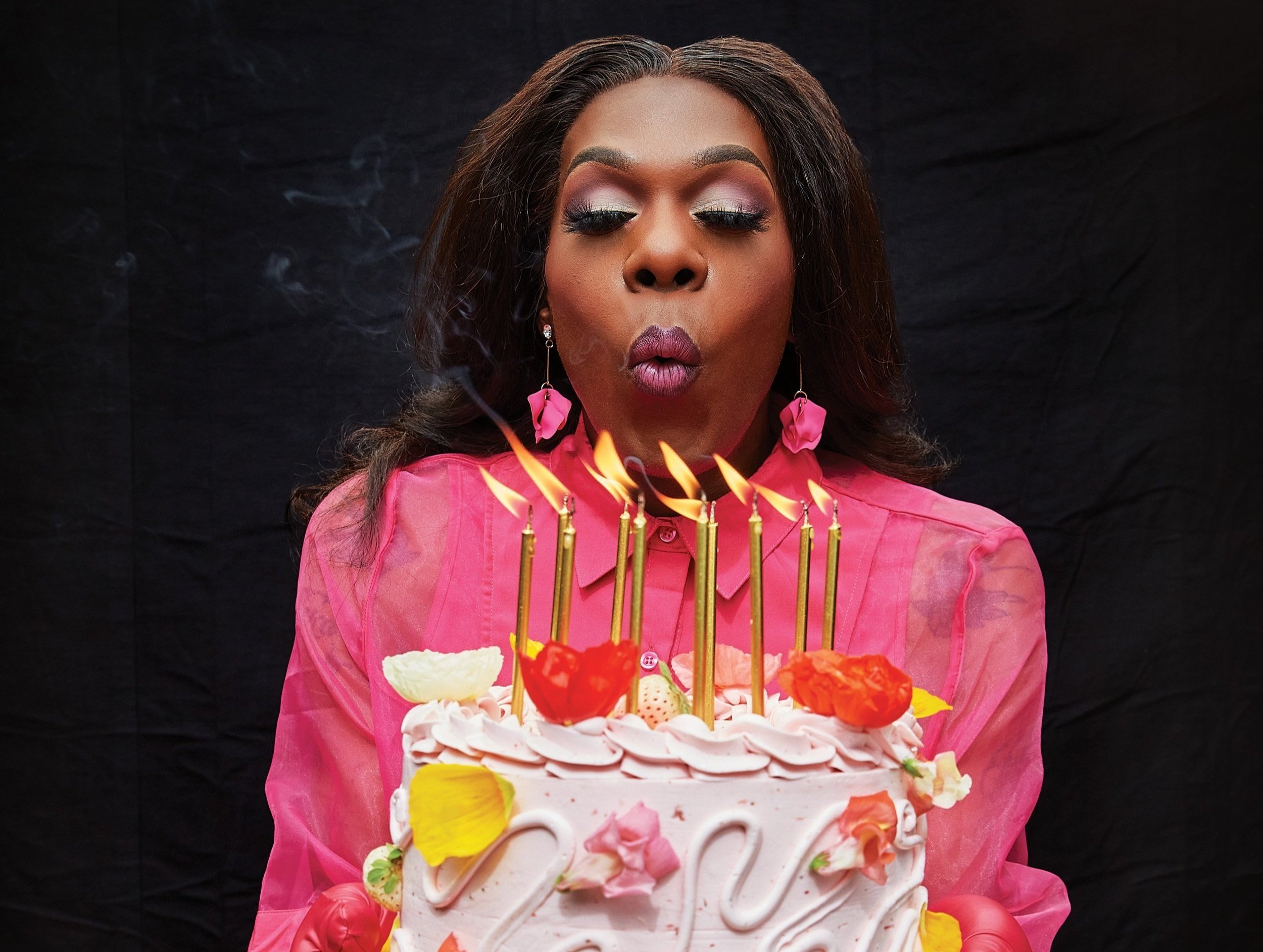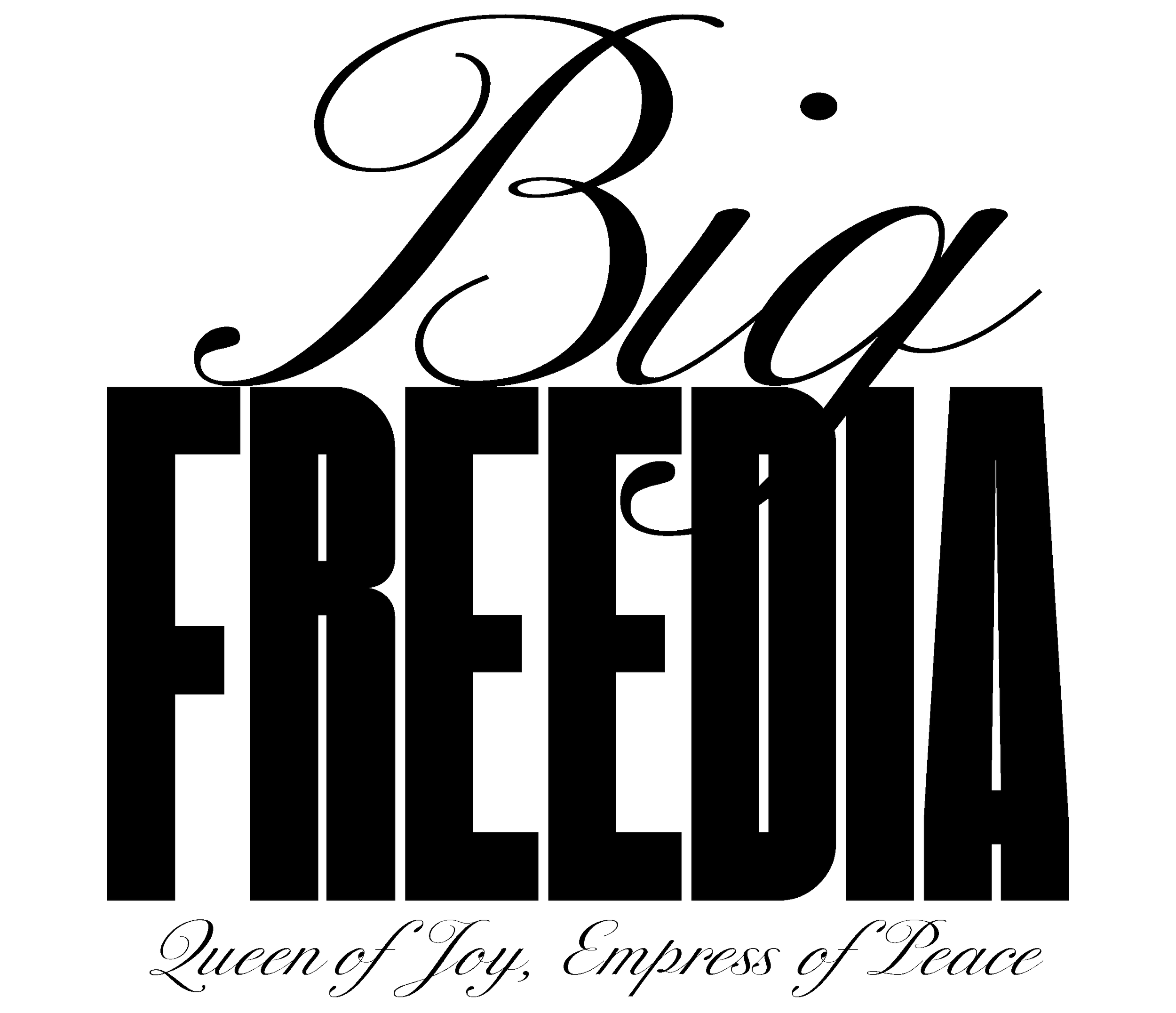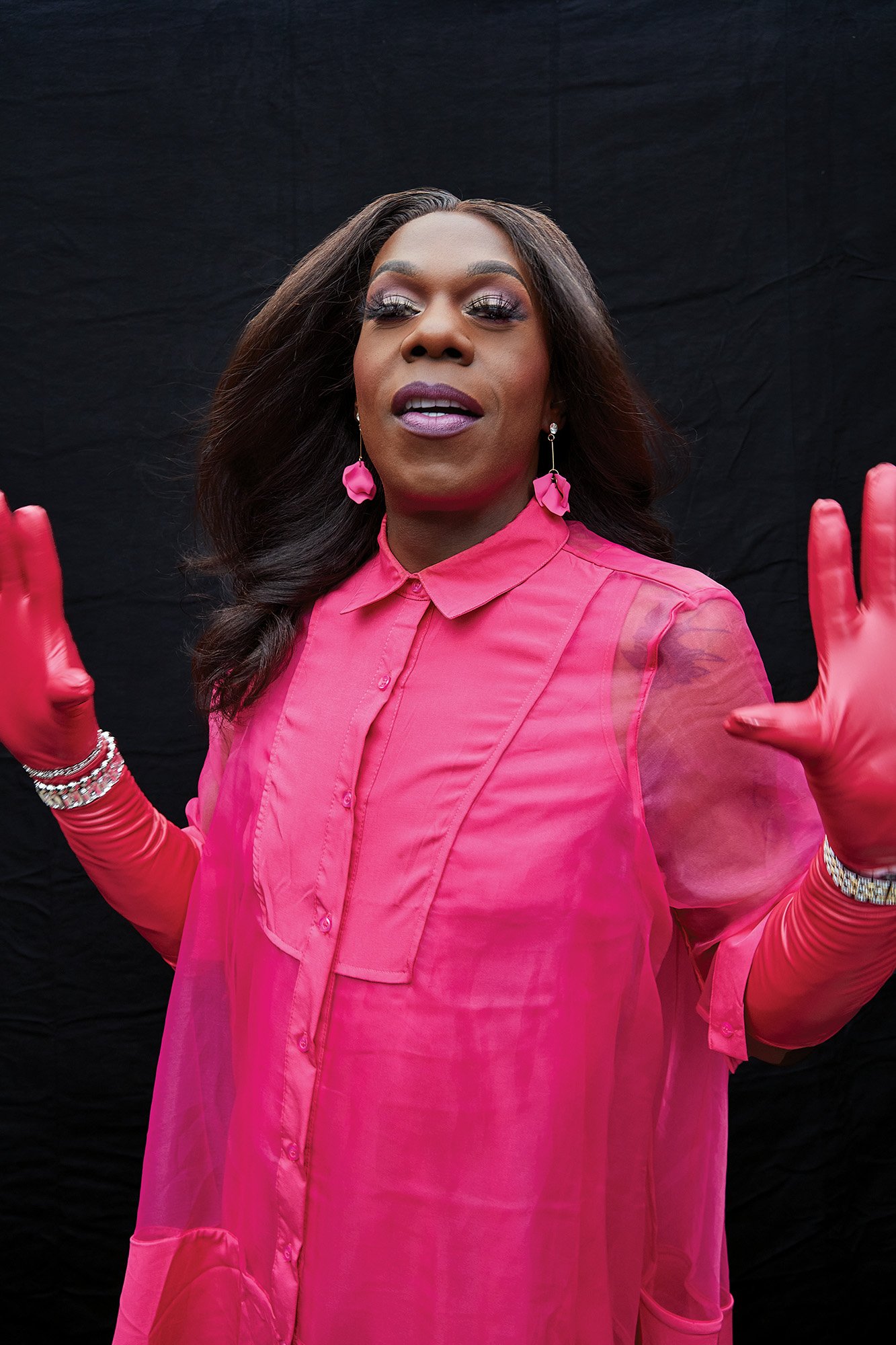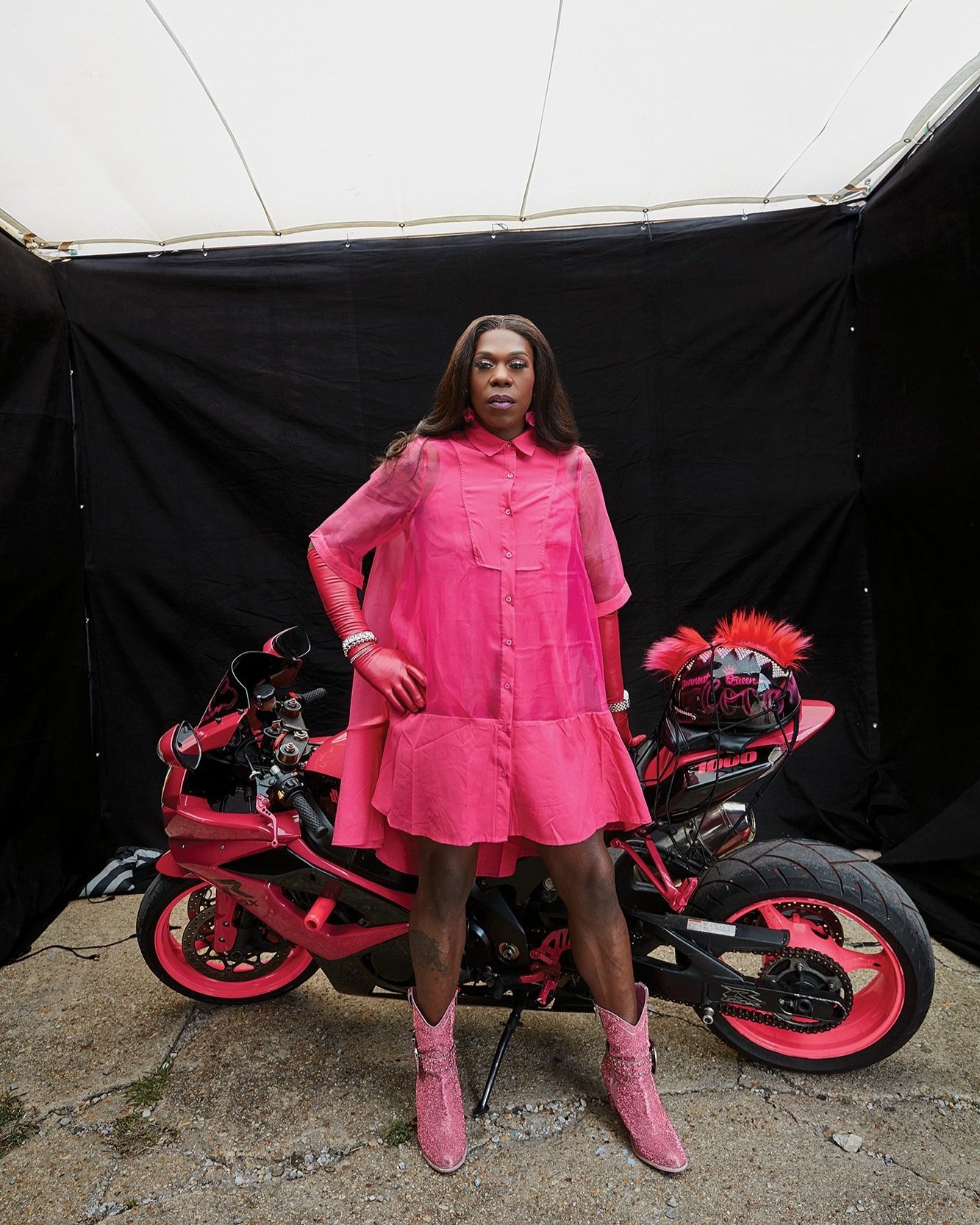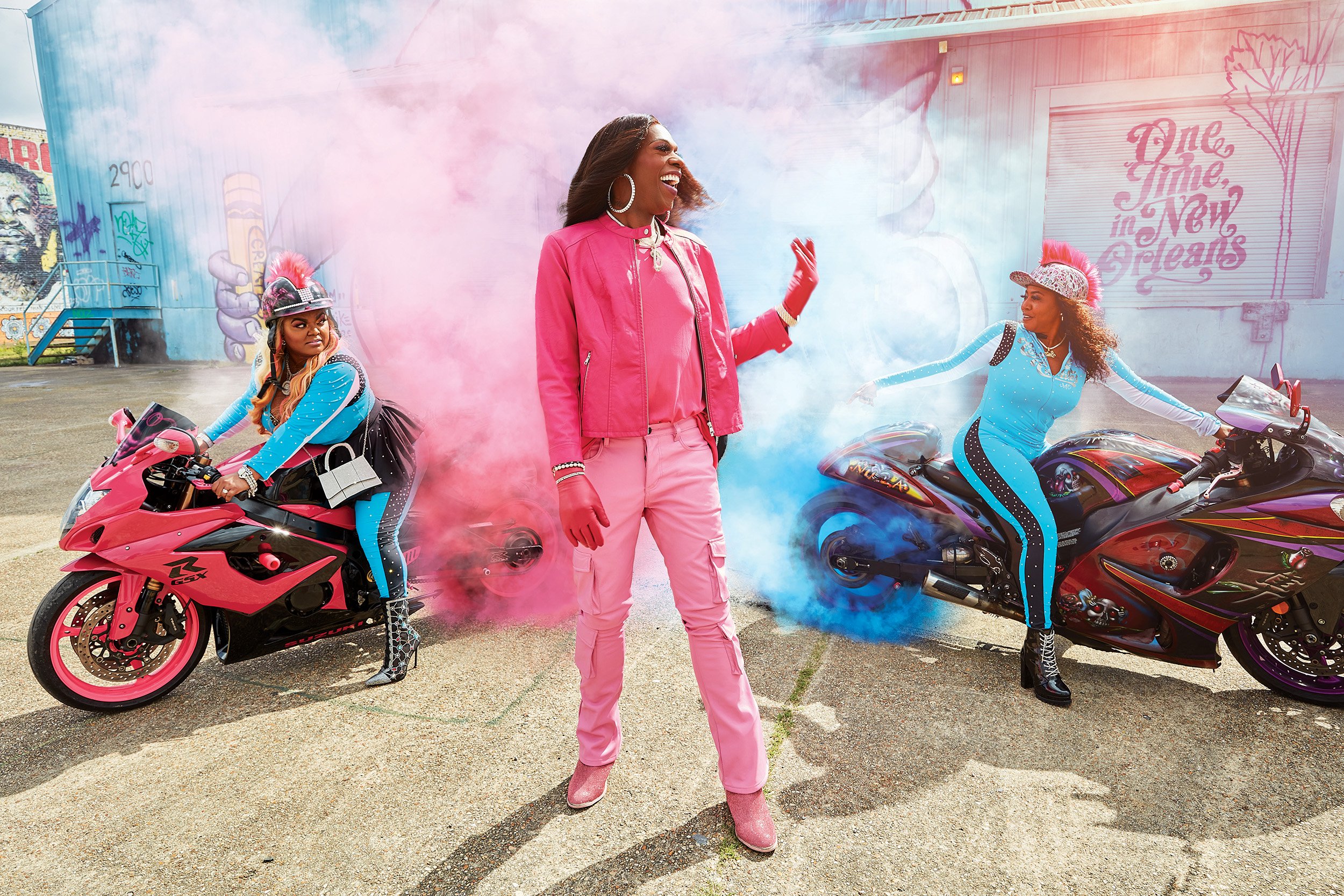The Bitter Southerner shares so much in common with our 10th anniversary cover star, the one and only queen diva, Big Freedia. A hometown hustler with big-time fans, she’s been grinding a long time for this moment. On the precipice of a new chapter, Freedia and author Maurice Carlos Ruffin talk about their shared beginnings in the city, her mother’s wisdom, creating joy in tough times, and the collection of exciting projects on her horizon.
Story by Maurice Carlos Ruffin | Photos by Cedric Angeles
April 4, 2023
If forced to choose one person to represent the physical embodiment of New Orleans, Big Freedia would be a pretty strong pick in my book. Yes, worldwide legends like Beyoncé and Drake have her on speed dial, but the electric, gender-fluid “Queen of Bounce” retains a real respect here from locals. And while New Orleans has a reputation for flash and debauchery, those who know the soul of the city understand that the other side of its beauty is something equally softer, more serene, just like our Freedia.
Can I tell you that, while preparing to speak with Freedia, I decided to practice twerking, Big Freedia’s signature move, for the very first time? Pull up any video of the performer and her squad at work, and you’ll find Freedia center stage, flanked by experts of the style who move their backsides in gravity-defying rotations, sometimes while standing on their head or with feet planted on a wall as if they’re astronauts on the space station. In front of my full-length mirror, I attempted a basic interpretation. I stooped into a low crouch and … tried. Dear reader, it didn’t go well. What else can I say? I don’t have the knees for it. From now on, I’ll leave this to Freedia and the professionals.
Although I’m from New Orleans myself, I can’t tell you the first time I encountered Big Freedia. It seems like she’s always been here. Rapping, chanting, spreading the boisterous city tradition of bounce, a hip-hop style spun off the Showboys’ “Triggerman” beat that all but begs anyone listening to shake their ass. In one earlier memory, it’s a sweaty afternoon in 2004. I’m at a family cookout and “An Ha, Oh Yeah” is playing from a boom box. In another, I’m at my mama’s in 2015, and she is laughing at something Freedia said on “Queen of Bounce,” the performer’s extremely popular reality TV show that ran for six seasons. If I bet you that more New Orleanians recognize a photo of Big Freedia than any of the last three vice presidents, I’m winning that wager. If I make that bet anywhere else in America, I still like my odds.
The day I meet Big Freedia for this profile is a surreal one. I set up camp on Royal Street near acclaimed artist Brandan “BMIKE” Odums’ massive, mural-covered Studio BE in New Orleans’ Ninth Ward. The Caramel Curves, the superfabulous all-Black, all-woman biker crew, are doing burnouts in the street, azalea pink and baby blue smoke emanating as they rev their engines. Kinfolk Brass Band struts down to Franklin Street playing “Iko Iko.” There’s a brother in a cowboy hat, Larry Overton, on a beautiful, tawny brown horse. He told me its name (Betty White? Queen Elizabeth? Quvenzhané Wallis?), but I lose that detail because I’m too busy wondering how Big Freedia is so unflustered by all the commotion on this hot and humid March day (which has me on the hunt for some air conditioning). That commotion includes a crowd of delighted onlookers who have popped their heads out of cottages, perked up from their porches, and peeked out of bars and a coffee shop.
Now, I wasn’t supposed to tell anyone that I was interviewing Big Freedia. Chats with megawatt celebrities of her stature are nearly state secrets until announced. But I may have told a few of my closest friends. Well, a dozen. OK, hundreds. Thank goodness I’m not a spy. I probably wouldn’t last very long. For a day, my phone buzzed with versions of this text or DM. “OMG! Please tell Big Freedia I love her,” followed by a chain of heart or smiley-face emojis.
What is it about this music artist from the humble corner of Josephine and Danneel streets in Central City, the rough but tender cultural heart of New Orleans, that engenders such affection? Once we start talking, it’s clear that she radiates an enthusiasm people crave.
“That’s what it’s about,” Big Freedia says. “There’s so much negativity and things happening around the world. Somebody got to bring good energy and positivity. You know, I’m glad that’s me. I want to bring a happy time to the party. Lay your hair down. Forget about your problems at home and in your life for a moment. Shake a little ass with Freedia, and then you can go back to your everyday life. I just want to bring joy and happiness to people’s lives.”
Big Freedia gets down to the Kinfolk Brass Band, led by brothers Richard and Percy Anderson, who founded the group in the aftermath of Hurricane Katrina in 2005.
We’ve sat down for our interview at Baldwin & Co., a bustling, Black-owned independent bookstore and coffee shop. With all my nervous energy, I had shown up early. I had turned down an offer of free coffee, but I change my mind and accept because I’m about to interview freaking Big Freedia. Some people know me around the spot and give me the nod (a couple of my novels sit on the shelves here, too). Then Big Freedia enters and, unsurprisingly, every head in the place swivels to watch her descend on the establishment. Her hair is laid. Her boots, incredible. She’s wearing dangly earrings and a commanding white, three-quarter-length leather vest with rows of twinkling silver studs. I’m a hair over 6 feet tall. I’m looking way up at Freedia.
When you meet an icon, it’s tempting to see them as more than human, but also other than human. Someone who lives above our ordinary concerns. Perhaps someone without a recognizable past, who comes from a world of imagination or the nowhere of the astral plane. But Big Freedia does come from somewhere very familiar to me. Turns out we’re around the same age (but Freedia is gorgeous and I’m just me). When I was a pre-teen in New Orleans East, young Freedia was doing jumping jacks and singing along with her church choir at Pressing Onward M.B.C. in Uptown New Orleans.
“Oh bey, I was doing every typical thing that the kids were doing at the time,” she says, sitting across from me. As I listen, I note, among other things, Big Freedia has excellent posture. She’s providing an example to us all without really trying. But I digress. “Watching cartoons on Saturday, eating my cereal, playing in the neighborhood. Jacks, jump rope, go skating, riding my bike, family picnics. I would go to the shop with my mom on Saturdays because, you know, she did hair. I would be the receptionist sometimes. I would sweep. I would be the helper.
“I did it all as a kid. All the fun things we do in New Orleans. We got to eat out on Fridays and Saturdays because she always did hair late on those nights so we would do stuff like go to Barrow’s, Pizza Hut, or McDonald’s. Also, I was still into church heavy. So I would go to choir rehearsal on the weekend. I would do Sunday school on Sunday morning and then church services. I did it all.”
From a new iteration of her reality show on Fuse, to a hotel project on Frenchmen Street, to a new album and summer tour, Big Freedia hasn’t taken a break since her cameo in Beyoncé’s “Break My Soul” this past summer.
As Freedia recalls her childhood, I begin to realize that we have many shared youthful experiences, especially in the realm of food and good times with family and friends.
Maurice Ruffin: Original Barrow’s Catfish restaurant by the bridge over there?
Big Freedia: Yes.
MR: That was the spot.
BF: Yes, it was.
MR: Since 1943.
BF: Yes. Jack Dempsey’s, we would go there.
MR: That mac ’n’ cheese!
BF: Yes. We would do all those fun things growing up as a kid. Skate ring.
MR: Skate Country?
BF: Skate Country.
MR: Yes, indeed.
BF: Yes, indeed. Movie theater.
MR: What? The Pitt Theatre.
BF: Yeah. Definitely.
MR: That’s the dollar show.
BF: That’s the dollar show. We were broke back then. (Laughing)
MR: Look. I ain’t even mad at you. (Laughing)
The Pitt, like all independent theaters, was clearly someone’s dream that probably dazzled its 1940s patrons. But the movie house was a shell of its original grandeur by the time I found it in the early ’90s (it closed in 1995). By then, it showed only second-run films. Now I see that it’s entirely possible that while I sat near the front munching popcorn and watching Clarice Starling enter that “Silence of the Lambs” house looking for Buffalo Bill, it was Freedia a few rows back with friends yelling, “Girl, don’t you go in there!”
Anyone who knows anything about Big Freedia knows that even though she’s a quintessential New Orleanian, she’s performed the world over. More proof that she can do both? She posts videos in her home kitchen cooking “booty poppin’ potatoes” and Tony Chachere’s-seasoned stuffed chicken, and she’s been sampled twice by Beyoncé. First, on the iconic track “Formation,” the debut single from Beyoncé’s 2016 album Lemonade. Millions heard her proclaim over the eerie, slithery synth: “I did not come to play with you hoes. I came to slay, bitch. I like cornbread and collard greens, bitch. Oh yes! You best’a believe it!” In the equally iconic video, Freedia’s voice booms over scenery of a wig shop and a stretch of double-shotgun Creole cottages. The video’s New Orleans footage was sourced from the documentary “That B.E.A.T.,” about the origins of bounce — a story that intertwines some of the South’s most popular rappers and queer club performers, including Freedia.
Beyoncé came back to Freedia again for the first single off Renaissance, “Break My Soul,” the song of summer 2022 that captured a collective burn-it-all-down energy in the zeitgeist. “I’m ’bout to explode, take off this load. Unleash my belt and make it go. I’m ’bout to explode, take off this load. Bend it, bus’ it open, won’t ya make it go. Release ya anger, release ya mind, release. Release ya job, release the time. Release ya trade, release the stress. Release the love, forget the rest,” she raps over the house beat.
After my disastrous twerking session, I checked Freedia’s website for further research. She’s booked for the rest of the millennium, it seems. I ask if she’s ever not traveling.
“Nope,” he laughs. Big Freedia laughs a lot. It’s an easy laugh. It’s one of the more endearing things about him. “Tomorrow, I’m going to New York. I mean, it’s a great thing. Better to be working than sitting my ass at home. I’ll tell you that!”
Yes, you may have noticed, I switched Freedia’s pronouns there. She’s talked at length about this publicly in the past, gender fluidity and how she doesn’t like to get hung up on labels, which she sees as part of the New Orleans state of mind.
“The label thing has become a thing around the world. In New Orleans, we love our people for who you are. With me, it doesn’t matter if they call me ‘he,’ ‘she,’ or whatever they call me; I can respond. When you know who you are, you’re comfortable in your own space; labels and pronouns don’t make a difference to that.”
Big Freedia with longtime friends Hoodpriss, Coco, and Tru of the Caramel Curves motorcycle club.
During our talk, as I flip through my mental images of Big Freedia on TV, performing under the Broad Street overpass or meeting fans all over the world, again and again I see someone entirely at home in their own skin. She says that’s her mom’s doing.
BF: My mom was like a second mom to all of my gay friends. She would open her doors to them. She would feed them. She would watch out for them if she’s riding up the street and they’re doing something they ain’t got no business doing. She would stop the car and say, “Get your ass in this car.” My mom was definitely a mom who looked out for many children. She was like a counselor. She was like a psychiatrist. She talked to many people. Listened to many people’s problems in situations at home and with their lovers. She was a great mom to be able to defuse situations and give you encouragement and advice. That was the good old days.
MR: It was like she put a covering on you. That makes a big difference in somebody’s life. When your mother accepts you, everything else is secondary.
BF: That’s what I used to tell them all the time. Once my mom accepted me, I didn’t need validation from anybody else in the world. And the girls in the neighborhood looked out for us. As they would say, we were their sissies (laughs). They would fight for us. They would stand up for us if anyone tried to talk about us or downgrade us or whatever. The girls of New Orleans held us down, and when it came to the bounce, they following us and shaking ass.
MR: What’s amazing as I look at you as the icon that you are, do you ever feel like the world is catching up to you? A lot of these young people can be themselves without always having to experience the struggles you had. They can look at you and go, “We can follow Freedia.”
BF: Yeah. I think so. I think I can be a role model to certain people and especially to young gay people trying to find their way. When I was in the White House, a guy came up to me and told me that him and his son built a bond from watching me and my mom on my TV show. And that his son was able to come out because of me. He just wanted to thank me. So I did a video for his son at the White House to encourage him. Moments like that just make me want to keep living and being myself.
When Freedia and I talk about our experiences in the aftermath of Hurricane Katrina, it hits me right in my feelings.While our hometown was devastated, Big Freedia became a beacon with the bright lights of her shows to call locals back to the city. Listen, most of us evacuees were too busy dealing with lying insurance companies to think straight. Many of us didn’t even know if the city could come back. Not Freedia. She knew and made sure locals knew she would be back home waiting for them.
BF: Oh, that was fun. I would get to the club and you would have thought that Michael Jackson had arrived because everybody was just so excited to see me. When I got on the mic, the choir was following behind me. It was crazy, the powerful reception at the clubs, the energy. People were excited to see each other because everybody was all over the place and it was just a New Orleans party.
MR: FEMA Fridays? [I’m referring to the government checks that displaced, tax-paying New Orleanians like myself used to pay for food, clothes, and hearth during those lean times.]
BF: Yeah. We brought the house down. FEMA Fridays went down. The line was down the street, round the corner, and it was a vibe. Everybody had they Red Cross and they FEMA money, so you know they were coming in stunting hard. They was buying bottles. They had they new outfits, and they fresh tennis [shoes], and they hair was done. It went down.
And, for Freedia, it’s still going down. Not only will she be performing everywhere this summer (“I’ve taken over the summer,” she says), including shows with LCD Soundsystem, but she also has a slew of wide-ranging projects on the way. Her second full-length album will drop soon. Hotel Freedia, with a restaurant, pool, and wraparound rooftop gallery, is under renovation just off Frenchmen Street, a drag east of the French Quarter lined with jazz clubs and live music venues. (“It’s going to be dope. It’s going to be an ambiance like no other.”) And, too, she has a cannabis line on the way as well as Big Freedia branded sunglasses, makeup, and eyelashes.
“We’re doing Freedia eyelashes for the girls where you can blink your eyes, honey. See the bling.”
Trainer and stable owner Larry Overton and his horse Harley Quinn recently went viral in a video on social media that shows the two riding down I-10 in front of the Superdome.
If it feels like Freedia is having a moment right now, it’s the hard-won manifestation of navigating an unprecedented career through some of the entertainment industry’s most chaotic shifts, particularly over the past decade. That’s when Big Freedia’s six-season reality show (that’s far longer than critical darlings like “Freaks and Geeks” and “Pushing Daisies”) “Queen of Bounce” first aired. Both professionally and personally intimate, the show chronicled her rise to international fame and her growing entourage, including dancers, DJs, and managers, but also her family, including her mother, uncle, and partner, Devon Hurst. But, of course, that level of public intimacy would put a strain on anyone.
“It was stressful in the beginning. Adjusting to that TV world with the cameras following you all the time. First season was rough for me. Second season got better. Third season, even better. Now, I know what I want to do. What I want to put out there in the world. I’m starting to learn how to control my emotions and my actions around everything that I’m doing. By the time it came to the sixth season, I was a pro. I was executive producer by the time the third season came. I started to see a vision of where I wanted to go and where I wanted my life to go in a certain direction and my career and my music. The TV show was a platform to show me changing all before their eyes. Each year getting better at what I do. And that’s what it was about.”
In addition to the full slate of aforementioned projects, Freedia has returned to Fuse with a new reality show, “Big Freedia Means Business,” set to debut in June. “It’s all about showing young people the ins and outs of business,” she says.
But what about her personal life? More specifically, what about Devon? He was a charismatic, yet mercurial, presence on the show. Last December, The New York Times ran a gorgeous photo essay, lit like a Golden Age still life painting, about holiday-season meals featuring the two. By all accounts, especially her Instagram, Big Freedia is an incredible chef, and the picture of her table-spread is idyllic — it’s all floral arrangements and food, like she’s surrounded by her loved ones. And Devon is right there at her side. Honestly, I’m not one to pry, but I hadn’t really seen much about them since the show stopped airing several years ago. So I had to ask.
BF: We’re in a rough place, but we’re still holding on.
MR: Well, to be with somebody a long time — there’s ups and downs.
BF: Most definitely. Life takes its share of changes.
MR: Everybody can relate to that.
BF: Most definitely. And when you love somebody, you endure the good and the bad and that’s what it’s about right now. Just trying to stick in there with him because I love him so much.
MR: That’s what love is.
BF: His knucklehead ass got to get it together.
MR: I’ll be praying for him myself.
BF: Please.
MR: Your uncle was on the show. What’s up with him?
BF: Uncle Percy? He passed away.
MR: I’m sorry to hear that.
BF: Yeah. That was my heart. I lost him in 2019, a year after I lost my brother, so I had some hard hits over the last few years, starting with my mom first, and then my brother and then my uncle. Three very dear people to me. But God is good. They are still with me in spirit, and they are making things happen. I have three guardian angels who are clearing the path and making things happen.
Big Freedia, Hoodpriss and Tru of the Caramel Curves motorcycle club.
MR: I haven’t heard you talk about your father.
BF: My father is Freddie Ross Sr., and he’s around. We talk. My dad was not around a lot when I was a younger kid, and then we started to build a relationship in my late 20s. We’ve been in contact ever since, and really just hanging out. He would come to some of the shows when he could. Unfortunately, he’s sick right now. Still yet holding on. I’m grateful for him.
MR: I’m going to pray for him, too. I’m curious about this idea of reconciliation — going from somebody not being in your life to now, when they’re a presence. Especially contrasted with the way your mother provided protection and cover for you, which you provide for a lot of people right now. Talk about trying to be a peacemaker and trying to have positive relationships.
BF: It means a lot. Prime example, what I just talked about with my dad not being around in the beginning and then coming as an adult. Just reconciling our relationship and building bonds and trust. It takes time and patience. You have to really pray on those situations and ask God for guidance and understanding. But when you love, and your love is unconditional, you can get through any situation and reconcile with anybody. And that’s what it’s about for me. I don’t like to hold grudges because you’re bitter for no reason. And those people maybe moved on. If you can reconcile, I think that’s best. Even if you never go back that way. Just apologizing and mending that bond. You know what I’m saying? It’s very important for people not to be holding onto things in the past that really will affect your future.
I won’t kid you — lately, it’s been easy to feel like the world is backward, inside out, irredeemable. Still, I’m an optimist. I’m bullish on us humans. We’re a resilient bunch, and if Big Freedia reminded me of anything, it’s that even when life is stressful, there’s always time to let your hair down and shake a little ass. Release your wiggle — that’s the New Orleans way. Who knows, maybe I’ll try to twerk again.
Header Photo: Big Freedia with longtime friends Hoodpriss, Coco, and Tru of the Caramel Curves motorcycle club.
Maurice Carlos Ruffin is the author of The Ones Who Don’t Say They Love You, which was a One Book, One New Orleans selection, a New York Times Editor's Choice, and was long-listed for the Story Prize. His debut, We Cast a Shadow, was a finalist for the PEN/Faulkner Award, the Dayton Literary Peace Prize, and the PEN America Open Book Prize.
Cedric Angeles is a photographer and director who crafts joyful and moving narratives for audiences worldwide. He is a man constantly on the move, photographing places and cultures with the goal of understanding how other people live. He approaches photography with an interest in narrative and the spirit of a documentarian. Cedric’s career began in the editorial world, traveling the globe shooting for award-winning publications. He now shares his passion for exploration and incredible ability to connect with any subject with a broader client base, being called on by companies working in food, hospitality, and lifestyle products to tell their brands’ stories in stills and motion. Cedric is based between New Orleans and New York, where he lives with his wife and two children. He is currently working on the feature-length film "Chingona," which documents the lives of three female boxers in Mexico City.
Read this and more amazing stories in Issue No. 5 of The Bitter Southerner magazine, available when you join at the $50 annual level or the $5 monthly level, or above.

